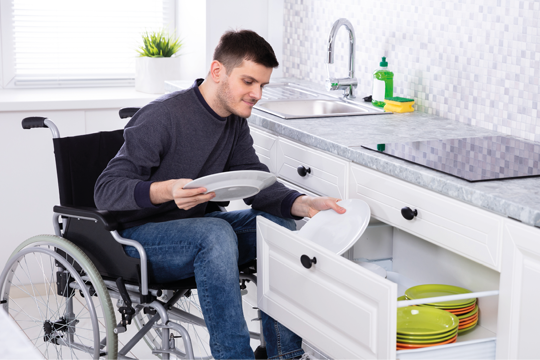-

Housing benefit
Housing Benefit is paid by your local authority to help towards your rent. You can claim Housing Benefit if you are:
- Over 16
- Liable to pay rent
- Have an income below a certain level.
The amount of you are entitled to depends on your:
- Income
- Rent
- Savings
- Whether other people live with you in the property (i.e. a partner, child(ren).
How do I apply?
You should contact your local authority's housing benefit team for information on how to make a claim.
Click here for your local office.
How will my Housing Benefit be paid?
You can ask for your housing benefit to be paid directly to us. We can then monitor the payments and make sure your rent is paid.
What should I do if my situation changes?
You must let housing benefit know immediately if your income or household changes.
Any changes which aren’t disclosed will leave you liable for repaying any housing benefit which is overpaid – either to you or to us.
Please also let us know any changes by contacting us. We can offer you help and support and refer you to external agencies where necessary.
Under occupancy
If you are of working age and have a spare bedroom, the amount of housing benefit you can claim is reduced.
Under the rules you are allocated one bedroom for each person or couple living as part of the household. There are exceptions:
- Children under 16 of the same gender are expected to share
- Children under 10 are expected to share regardless of gender
- A disabled tenant or partner who needs a non-resident overnight carer will be allowed an extra room.
If you have one spare bedroom, your housing benefit will be cut by 14% of the rent you pay every week. If you have two or more spare bedrooms, it is cut by 25%. You will need to pay the balance that remains between the amount of housing benefit you get and the total amount of your rent.
If you housing benefit decreases due to under occupancy, it is important you continue to pay your rent in full. If you are struggling, please contact us – we are here to help.
Housing benefit arrears
If your rent account is in arrears because of a delay in your local authority processing your claim for benefit, you must follow up with them and pursue your claim. Please also let us know of the delay and your progress.
-

Universal Credit
Universal Credit is a monthly benefit payment to help with living costs, including your rent, and is replacing the following benefits:
- Housing Benefit
- Income Support
- Income based Job Seekers Allowance (JSA)
- Income related Employment and Support Allowance (ESA)
- Child Tax Credit
- Working Tax Credit

I can help you with Universal Credit claims. Get in touch and I’ll be happy to support you.
Making a Universal Credit claim
To be able to make a claim you will need:
- Regular access to the internet
- An email address
- A mobile phone number
- A bank account to have your money paid into
- You will also need to create an account with Universal, which will give you access to an online ‘journal’ which you will use to contact Universal Credit.
How to apply for Universal Credit
When you are ready, claims are made online here www.gov.uk/universal-credit/how-to-claim. You will need to have information about your rent, income, savings and any childcare cost information to hand.
You can expect to wait around five weeks for your claim to be processed and your first payment to be made. But in the meantime you are eligible for an ‘advanced payment’ to help you manage your living costs.
You can apply for this through your online journal or by speaking with your Job Centre Work Coach. The Department for Work and Pensions (DWP) will take a deduction from your benefit entitlement over the following 12 months to repay this money.
Support to make a claim
Citizens Advice run a free, independent service called ‘Help to Claim’. They can provide support from the early stages of making a claim up to you receiving your first payment.
Click here to visit their website, call 0800 144 8 444 or contact your local Citizens Advice services in your area - you can find details here.
Existing benefits
If you are already on the legacy benefits above you can continue to claim and don’t need to do anything differently unless:
- Your circumstances change – please report any changes straight away to the Department for Work and Pensions (DWP)
- The DWP contacts you about moving your claim over to Universal Credit. For more information about this, click here.
If you are thinking of making an application to move to Universal Credit contact us and we can check you won’t be worse off financially by switching.
Although the government is working towards moving everyone over to Universal Credit by 2024, many people will be better off remaining on their current benefits for as long as possible. Moving across earlier could also put any protection of ‘like for like’ benefits in the future at risk.
That said, there are some circumstances where a move to Universal Credit could unlock more income.
Moving home is one of the triggers for transferring onto Universal Credit. If you already have an existing claim for housing benefit and are moving within the same local authority area, with no changes to your circumstances, you should be offered the choice whether to remain on housing benefit or move to Universal Credit. It’s important to check out which way will be better for you and your circumstances.
Other benefits

Pension credit brings the weekly income of pensioners up to a minimum amount.
In addition to extra income, receiving pension credit also unlocks other financial benefits such as a free TV licence for over 75s, council tax support, NHS dental care and help towards the cost of glasses.
Take-up of pension credit is low – with current estimates suggesting around 36,000 people across Greater Manchester are currently missing out on around £70,000.
If you or someone you know is of state pension age, make sure you check if you are entitled to this ‘top up’ benefit.
Under new government legislation, those who receive pension credit will also receive the Winter Fuel Allowance.
Use our benefits calculator to see if you are eligible for more support with your pension or contact us if you’d like some help.

There are a series of benefits designed to support parents and carers with the cost of childcare.
The government’s Childcare Choices website offers an interactive search tool to help you determine what is available for you, whether your children are babies, toddlers, pre-teens or teenagers.
Click here to visit the site.
The Family Benefits Advice Service also provides free, impartial and confidential advice to parents and carers to help them maximise their income and understand their entitlements.
Find more information here or call their freephone helpline on 0800 028 3008.
If you’re on certain benefits and are pregnant or have a child under four, you’re also eligible for the Healthy Start vouchers.
Receive £8.50 a week for children aged 0 to one and £4.25 a week for those aged one to four. The vouchers can be spent on fruit, vegetables, formula and milk, and you also qualify for free vitamins. Click here for more information.
If you have children in school, they may be eligible for free school meals - speak to you local council about this and how to claim.

Since April 2013, Disability Living Allowance (DLA) has been replaced by a Personal Independence Payment (PIP) for eligible people aged 16 to 64.
The payment is made up of a mobility allowance and a living allowance and is designed to help towards some of the extra costs arising from a long-term illness, disability or mental health condition. It is based on how a person's condition affects them, not the condition they have.
You don’t need to have worked or paid National Insurance to qualify for PIP, and it doesn’t matter what your income is, if you have any savings or you’re working. It is not means-tested or subject to tax.
If you currently claim Disability Living Allowance, the Government is introducing Personal Independence Payment in stages over a number of years.
The DWP should write to everyone claiming DLA to invite them to claim PIP. It is important that you make a claim for PIP as your DLA will end.
If a claimant of DLA was under 16 or over 65 when PIP was introduced, they will continue to receive DLA.
Find out more and make a claim here.

Council tax benefit is claimed separately from your local council.
If you have children in school, you can also speak to your local council about claiming free school meals.
Find contact details for your local authority in our local support section here.
